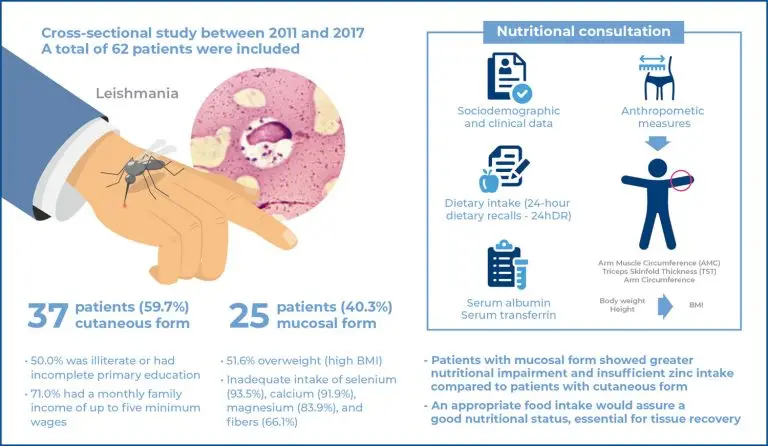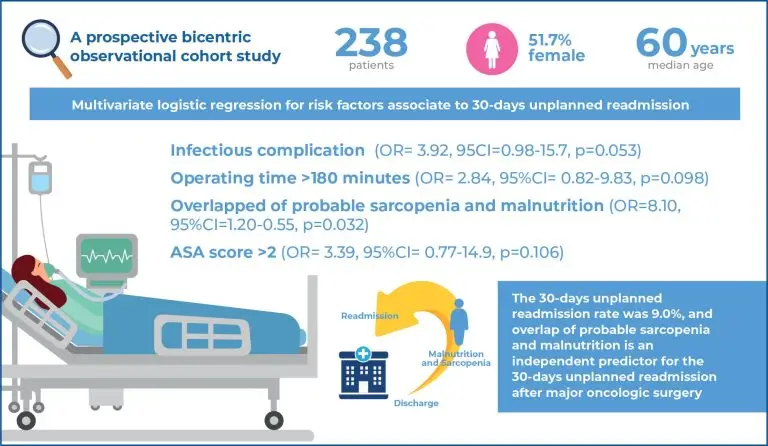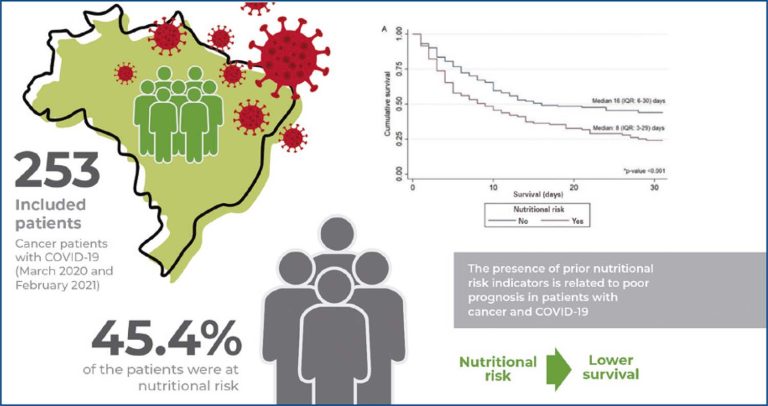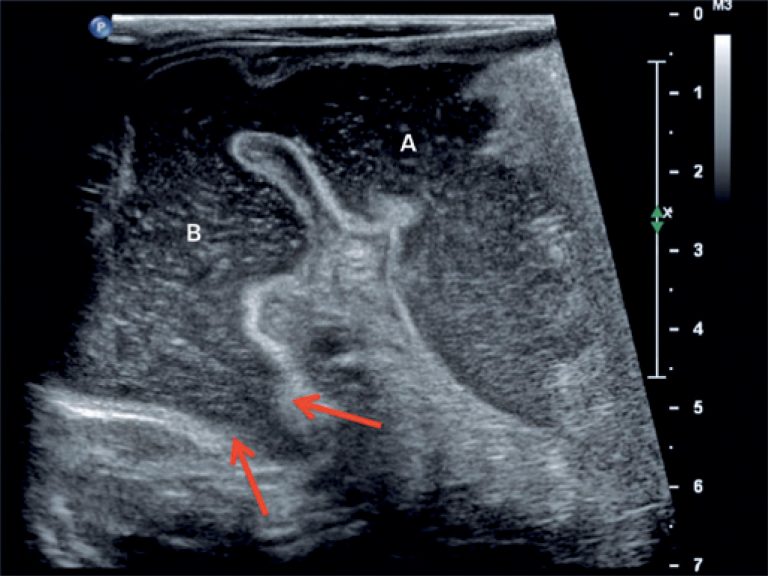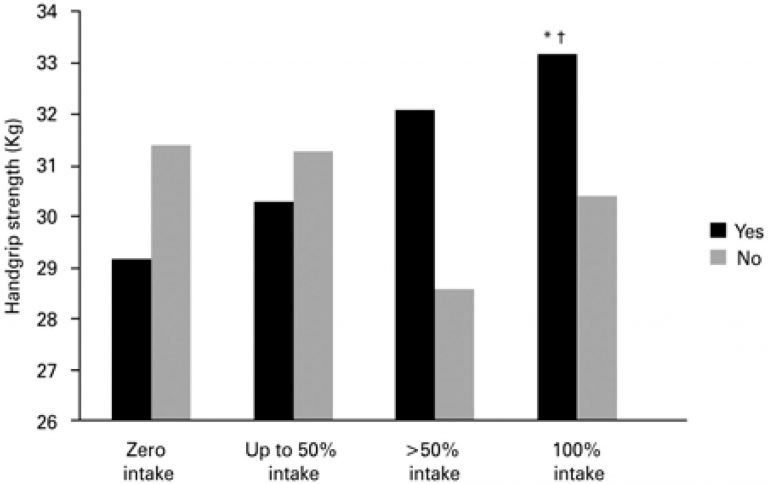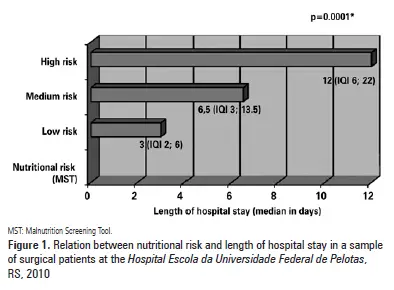17/Feb/2025
Adequacy of nutritional status and dietary intake of adult and elderly patients with American Tegumentary Leishmaniasis
einstein (São Paulo). 17/Feb/2025;23:eAO0992.
View Article17/Feb/2025
Adequacy of nutritional status and dietary intake of adult and elderly patients with American Tegumentary Leishmaniasis
DOI: 10.31744/einstein_journal/2025AO0992
Highlights ■ Most patients had an inadequate intake of selenium, calcium, magnesium, and fiber. ■ Patients with mucosal had lower body weight, arm muscle circumference, and serum albumin and zinc intake. ■ Mucosal is associated with insufficient zinc intake, low body weight, and the depletion of serum albumin and transferrin. ■ Oropharyngeal lesions are associated with calorie malnutrition and serum protein depletion. ABSTRACT Objective: Patients with American Tegumentary Leishmaniasis often experience malnutrition, weight loss, and dehydration; however, their eating profile […]
Keywords: Communicable diseases; Eating; Leishmaniasis, cutaneous; Malnutrition; Nutritional assessment; Wound healing
07/Oct/2024
The 30-day readmission rate of patients with an overlap of probable sarcopenia and malnutrition undergoing major oncological surgery
DOI: 10.31744/einstein_journal/2024AO0733
Highlights Probable sarcopenia plus malnutrition was significantly associated with unplanned readmission. Overlap of probable sarcopenia and malnutrition was an independent risk factor for readmission. Certification of whether the patient is malnourished and/or sarcopenic preoperatively is necessary. SARC-F and subjective global assessment can effectively and easily assess sarcopenia and malnutrition at admission. ABSTRACT Objective: To assess the 30-day unplanned readmission rate and its association with overlapping probable sarcopenia and malnutrition after major oncological surgery. Methods: A prospective bicentric observational cohort study […]
Keywords: Malnutrition; Nutritional status; Patient readmission; Postoperative complications; Sarcopenia; Surgical oncology
07/Mar/2023
Cancer patients with COVID-19: does prior nutritional risk associated with cancer indicate a poor prognosis for COVID-19?
einstein (São Paulo). 07/Mar/2023;31:eAO0172.
View Article07/Mar/2023
Cancer patients with COVID-19: does prior nutritional risk associated with cancer indicate a poor prognosis for COVID-19?
DOI: 10.31744/einstein_journal/2023AO0172
Highlights Patients at nutritional risk had a lower survival than those not at nutritional risk. Nutritional risk had good discriminatory accuracy to predict death. Nutritional screening should be included as an essential part of care for these patients. ABSTRACT Objective To verify whether the presence of related nutritional risk indicators prior to COVID-19 diagnosis is associated with poor survival in patients with cancer. Methods We retrospectively analyzed the data of hospitalized cancer patients who tested positive for COVID-19 between […]
Keywords: Coronavirus; Coronavirus infections; COVID-19; Malnutrition; Neoplasms; Nutritional status; Prognosis
19/Nov/2020
Vomiting in newborns as a result of a duodenal membrane: two case reports
DOI: 10.31744/einstein_journal/2020RC4641
ABSTRACT Vomiting episodes in newborns are extremely common and often attributed to gastroesophageal reflux. The symptoms of vomiting, however, may be caused by other complications. In this report, we present two cases of a 1-month-old male and a 2-month-old female, both presenting vomiting episodes that led to malnutrition. Some pediatricians often attribute the diagnosis of gastroesophageal reflux to newborns that are vomiting; however, there is a portion of the population that has other causes that lead to similar symptoms. The […]
Keywords: Child; Duodenal membrane; Gastroesophageal reflux; Malnutrition
21/Oct/2020
Discriminative power of an adapted version of Nutritional Risk Screening 2002 applied to Brazilian older adults
einstein (São Paulo). 21/Oct/2020;18:eAO5309.
View Article21/Oct/2020
Discriminative power of an adapted version of Nutritional Risk Screening 2002 applied to Brazilian older adults
DOI: 10.31744/einstein_journal/2020AO5309
ABSTRACT Objective: To investigate the discriminative power of Nutritional Risk Screening 2002. Methods: A cross sectional study involving one hundred participants aged ≥60 years. The original and adapted versions of Nutritional Risk Screening 2002 and the Mini Nutritional Assessment were used. Nutritional Risk Screening 2002 adaptation consisted of a lower age cutoff (60 years or older) for addition of one extra point to the final score. Results: Screening using Nutritional Risk Screening 2002 revealed higher nutritional risk among patients aged […]
Keywords: Aged; Malnutrition; Nutrition therapy; Nutritional assessment; Nutritional status
28/Dec/2018
Effects of overnight fasting on handgrip strength in inpatients
DOI: 10.31744/einstein_journal/2019AO4418
ABSTRACT Objective: To investigate the effects of overnight fasting on handgrip strength of adult inpatients. Methods: A prospective clinical study enrolling 221 adult patients. The endpoints were handgrip strength obtained by dynamometry in three time points (morning after an overnight fasting, after breakfast and after lunch) and the cumulative handgrip strength (mean of handgrip strength after breakfast and lunch) in the same day. The mean of three handgrip strength measures was considered to represent each time point. A cut-off for […]
Keywords: Diet; Fasting; Malnutrition; Muscle strength; Nutritional status
04/Jul/2018
The importance of dysphagia screening and nutritional assessment in hospitalized patients
DOI: 10.1590/S1679-45082018AO4189
ABSTRACT Objective: To determine frequency of dysphagia risk and associated factors in hospitalized patients as well as to evaluate nutritional status by using different methods and correlate the status with scores of the Eating Assessment Tool (EAT-10). Methods: This was a cross-sectional study including 909 inpatients of a philanthropic hospital. For the diagnosis of dysphagia we used an adapted and validated Brazilian version of the Eating Assessment Tool (EAT-10). The nutritional status was evaluated through the subjective global assessment, and […]
Keywords: Deglutition disorders; Hospitals; Malnutrition; Nutrition assessment
01/Apr/2017
Economic analysis of costs with enteral and parenteral nutritional therapy according to disease and outcome
einstein (São Paulo). 01/Apr/2017;15(2):192-9.
View Article01/Apr/2017
Economic analysis of costs with enteral and parenteral nutritional therapy according to disease and outcome
DOI: 10.1590/S1679-45082017GS4002
ABSTRACT Objective To conduct an economic analysis of enteral and parenteral diet costs according to the type of disease and outcome (survivors versus deaths). Methods It is a cross-sectional, observational, retrospective study with a qualitative and quantitative design, based on analysis of hospital accounts from a healthcare insurance provider in the Southern region of Brazil. Results We analyzed 301 hospital accounts of individuals who used enteral and parenteral diets. The total cost of the diet was 35.4% of hospital account […]
Keywords: Costs and cost analysis; Health Evaluation; Health management; Malnutrition; Nutrition therapy
01/Jan/2016
Thickness of the adductor pollicis muscle in nutritional assessment of surgical patients
DOI: 10.1590/S1679-45082016AO3596
ABSTRACT Objective To evaluate the correlation between thickness of the muscle adductor pollicis and anthropometric measurements, body mass index and Subjective Global Assessment in the nutritional assessment of surgical patients. Methods The study population comprised patients admitted to the general and reconstructive surgery unit of a university hospital in the city of Vitória (ES), Brazil. The inclusion criteria were patients evaluated in the first 48 hours of admission, aged ≥20 years, hemodynamically stable, with no edema or ascites. Data analysis […]
Keywords: Malnutrition; Muscles/anatomy & histology; Nutrition assessment; Surgical procedures operative/methods; Thumb/anatomy & histology
03/Jul/2013
Nutritional screening in surgical patients of a teaching hospital from Southern Brazil: the impact of nutritional risk in clinical outcomes
DOI: 10.1590/S1679-45082013000200002
OBJECTIVE: To assess the prevalence of nutritional risk in surgical patients of a teaching hospital and its associated factors. METHODS: A cross-sectional study with secondary data of surgical ward patients of the Hospital Escola da Universidade Federal de Pelotas, from April to October, 2010. Patients were evaluated up to 36 hours after admission using the Malnutrition Screening Tool. RESULTS: The study included 565 patients, with a mean age of 52.8±15.6 years, and the majority (51%) was female. More than 30% […]
Keywords: Malnutrition; Nutritional therapy; Surgical procedures


